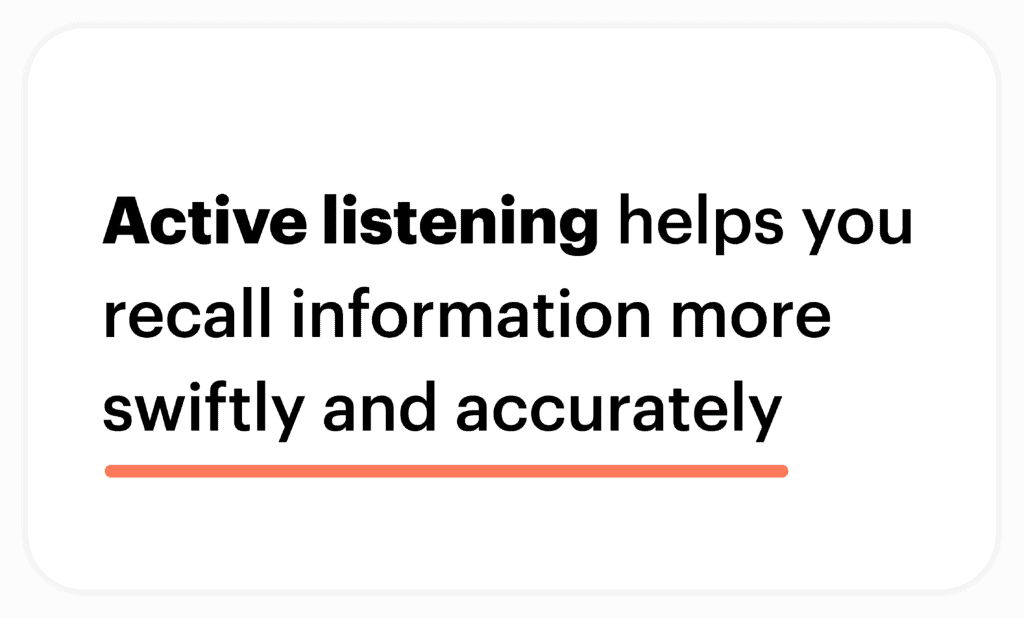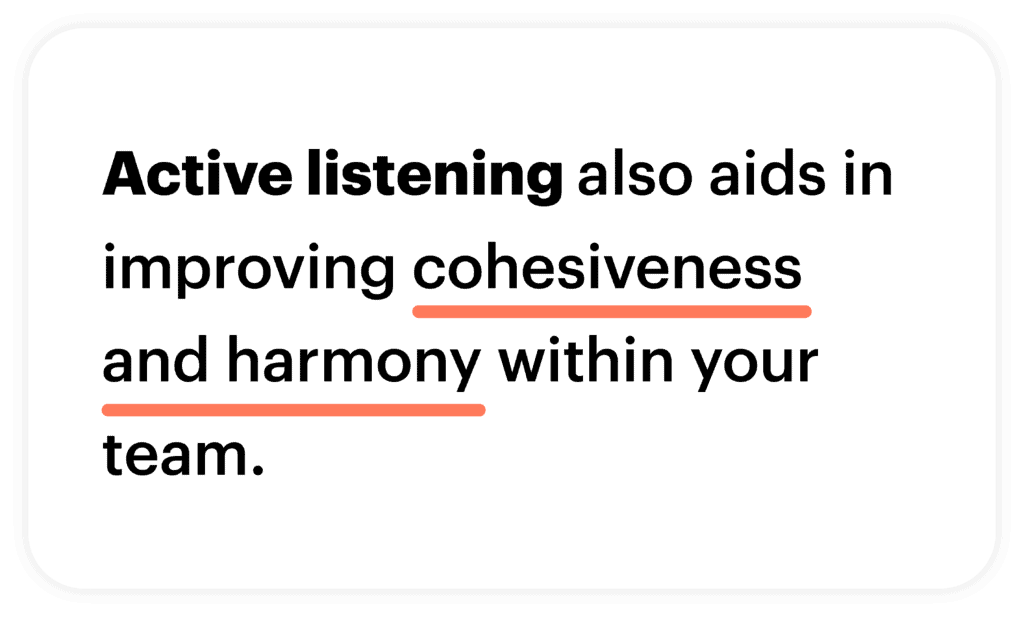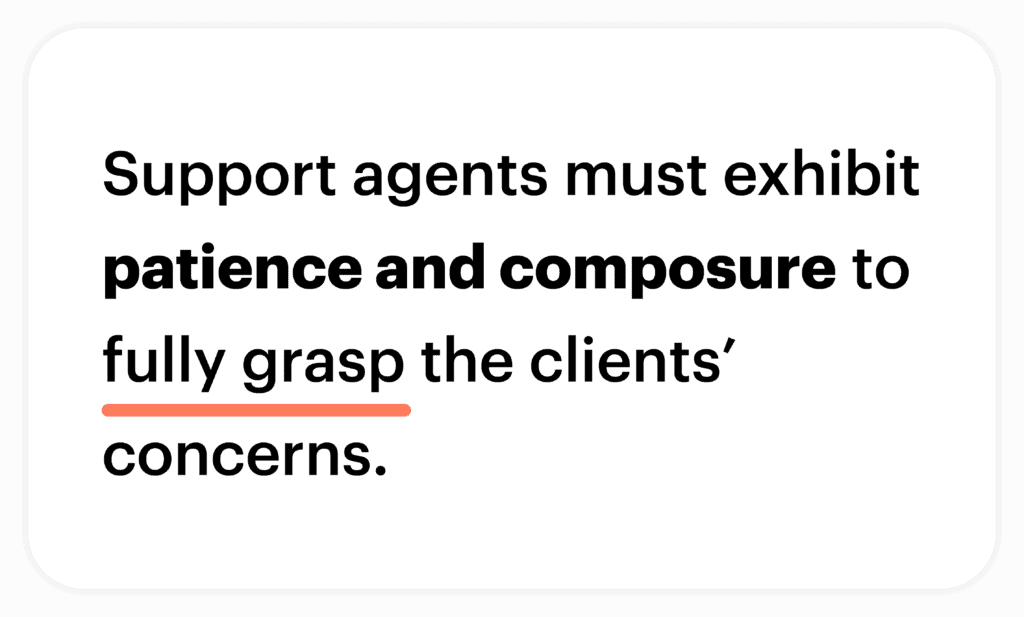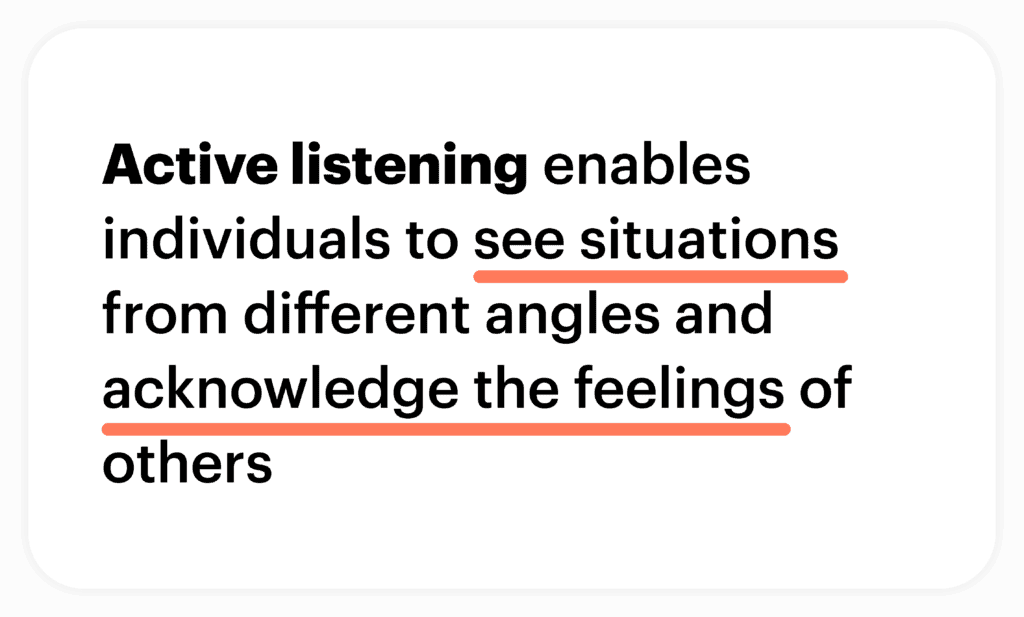Active listening is an essential skill that can greatly enhance your effectiveness in the workplace, particularly in B2B customer support and management. This powerful communication technique allows you to truly understand the needs and concerns of your clients and relay them to your team.
In the world of B2B relationships, communication skills are of utmost importance. Active listening is a cornerstone of these skills, empowering support teams to efficiently manage clients and address their needs.
The advantages of active listening are often overlooked in organizations, yet mastering this skill can lead to improved productivity, effective problem resolution, and clear expectation-setting. Let’s dive deeper into the value of active listening in B2B customer support and management.
The Art of Active Listening in B2B Customer Support and Management Active listening demands
concentration and attentiveness to fully grasp what your clients are communicating. The key difference between active and passive listening lies in the self-discipline required to truly process and understand the information being shared.
B2B customer support professionals must excel at active listening to effectively comprehend their clients’ concerns. Failing to do so may lead to improper guidance, resulting in a negative customer experience and potential damage to your company’s reputation. Active listening involves:
- Crafting thoughtful responses to demonstrate engagement
- Deciphering the underlying meaning
- Attentively absorbing the message
- Retaining the information for future reference
In face-to-face interactions, support agents should also exhibit positive body language to signal engagement and understanding.
Implementing active listening in your B2B customer support role can make you appear more attentive and focused, allowing you to make better decisions based on a deeper understanding of the client’s needs. This skill is invaluable when clients have questions or concerns, as actively listening enables you to provide them with more accurate guidance, ultimately enhancing their overall experience and increasing client retention. Now, let’s explore some specific benefits of active listening in B2B customer support and management.
1. Avoid Missing Crucial Information
Actively listening to your clients enables you to absorb critical details and engage with them more effectively. Focusing on the entire message with intent and attention boosts your connection with customers, which is vital for those in training or educational sessions.

Active listening helps you recall information more swiftly and accurately. For B2B customer support professionals, grasping clients’ pain points and providing the right solutions is essential. Active listening thus greatly benefits these agents in performing their roles efficiently.
Furthermore, team leaders shoulder the responsibility of training and guiding their team members. To do so, they must actively listen and comprehend the instructions before cascading them down to their team, ensuring that everyone performs up to the expected standards.
If a team leader fails to actively listen, they risk overlooking crucial details in the message. This oversight can lead to confusion and hinder the team’s productivity, as tasks may not be executed correctly.
2. Fosters Trust and Builds Robust Relationships
In B2B customer support, establishing strong relationships with both new and existing clients is essential for retaining them. This process plays a pivotal role in creating brand loyalty and fostering trust between clients and businesses. By honing active listening skills, you can ensure your support team thoroughly understands clients’ concerns and provides appropriate solutions.

Active listening also aids in improving cohesiveness and harmony within your team. Team leaders should be attentive to any signs of disengagement among team members. Watch for the following indicators:
- Disinterest when you or someone else is speaking to them
- Hesitation in sharing information
- Preference for emails and other communication methods over in-person meetings
These signs suggest a lack of trust and connection between you and your team members, which may result in reduced productivity. In such situations, cultivating a habit of active listening is crucial.
Your team will better understand your perspective if they actively listen and apply the message to their work. Likewise, team members will feel valued when you attentively listen to them and use the vital information they provide to make informed decisions. In short, active listening helps establish trust and build a strong, cohesive team.
3. Fosters Compassion and Empathy
Clients typically reach out to B2B customer support agents when they encounter issues with your business’s products or services. As a result, support agents must exhibit patience and composure to fully grasp the clients’ concerns – and that’s where active listening comes into play.

Clients may express a range of emotions, including frustration and anger. Failing to actively listen and understand their problems may exacerbate their distress. Thus, it is crucial for support agents to develop these soft skills to better assist their clients.
One effective approach is to ask follow-up questions and cultivate empathy through these inquiries. Demonstrating empathy lets clients know that you understand their issues, ensuring they feel heard and helping to defuse potentially escalating situations.
4. Facilitates Issue Resolution
In addition to client concerns, teams may face internal issues that result in conflicts. Such minor disputes can hinder productivity and create misunderstandings. Often, these problems arise from team members not actively listening to and understanding one another’s perspectives.
Active listening can help eliminate confusion by ensuring that team members accurately hear and comprehend their colleagues’ viewpoints. People can become entrenched in their own opinions, neglecting to carefully consider the views of others.

Active listening enables individuals to see situations from different angles and acknowledge the feelings of others. It sets the stage for truly understanding each other’s messages and fostering a culture of respect. This skill is particularly valuable for customer support agents in a B2B context.
By putting themselves in clients’ shoes, agents can assess problems from the clients’ perspective. Once they comprehend the issues, they can offer effective resolutions. In this way, active listening can greatly benefit support agents when addressing various challenges.
5. Unlocks a Wealth of Advantages
Active listening is an invaluable habit that can benefit you and your team in the long run. By incorporating active listening skills, you can witness a significant improvement in productivity. Here are some advantages B2B customer support teams can gain from active listening:
- Support staff can engage with clients to identify their pain points, understand their valid concerns, and work toward resolving them swiftly.
- Active listening reduces the likelihood of negative customer experiences. Clients feel heard and understood, leaving them less likely to be dissatisfied.
- Even sales teams can leverage active listening to better engage with clients, allowing them to effectively pitch products and services by fully comprehending the clients’ perspectives.
These are just a few of the benefits your team can enjoy by embracing active listening. Naturally, you may be curious about how to train customer support teams to excel in this area. Let’s explore how to develop these skills among call center agents.
Cultivating the Habit of Active Listening for Customer Support Agents
Developing active listening skills doesn’t require any complex techniques. With just a few steps, you can become a better listener and effectively understand others’ messages. This habit is particularly important for customer support agents who interact with clients daily and can also help prevent internal conflicts within your team. Let’s examine the steps to develop the habit of active listening for B2B customer support agents:
Step 1 – Remain Calm and Stay Focused
Initially, it’s crucial not to feel pressured while listening to others. Customer support agents should remain composed and relaxed to maintain their concentration. This approach will help them better understand and grasp the other person’s message.
Avoid getting distracted by background noises that could interfere with your conversation. If there is an issue with the client’s phone line that hampers your focus, kindly inform them of the situation.
Step 2 – Visualize the Speaker’s Message
Utilizing your imagination to create a mental image of the information being conveyed is an effective way to gain a deeper understanding of the other person’s concerns. This approach allows you to devise solutions to address their issues. One helpful strategy is taking notes throughout the conversation.
Jotting down key points or phrases will help you better connect with the other person. Also, avoid mentally rehearsing your response while listening to them, as this can derail your focus and diminish your concentration. If your mind starts to wander, calmly recenter yourself and regain your focus.
Step 3 – Refrain from Interrupting
It’s crucial for customer support agents to attentively listen to their clients without interrupting. Interruptions can convey a negative impression and give the impression that you’re not genuinely listening. So, steer clear of interrupting or coming across as aggressive when speaking with clients.
Ideally, let clients ask for solutions rather than providing them unsolicited. No matter who you’re speaking with, allow them to finish their point before offering your suggestions.
Avoiding interruptions is essential for active listening, as you won’t fully comprehend the other person’s concerns before providing solutions. Furthermore, listening carefully reduces the likelihood of clients countering your solution with additional problems.
Step 4 – Feel Free to Ask Questions
There may be instances when you miss something or lose focus momentarily. In such cases, don’t hesitate to ask questions to revisit the topic and gain a better understanding. Clients generally won’t mind repeating their concerns if it helps you grasp the issues they’re facing.
Additionally, asking questions can be an effective way to steer the conversation back on track. Clients may experience multiple issues at once and may start discussing the next problem. In such instances, you can gently prompt them to revisit the initial issue and address it first.
Step 5 – Provide Consistent Feedback
Active listening enables you to offer feedback to the other person, demonstrating your full attention and engagement during the conversation. Whether interacting over the phone or in person, providing regular feedback is essential.
You can also use verbal cues, such as “hmmm” or “uh-huh,” to signal your connection with the speaker. These expressions convey the impression that you’re actively engaged with them. However, be mindful not to overdo it and use these cues appropriately.
In Summary
Active listening plays a pivotal role in enhancing B2B customer support and management. It not only improves communication between support agents and clients but also fosters trust and builds stronger relationships. By mastering the art of active listening, support agents can better understand customers’ pain points, empathize with their concerns, and offer effective solutions.
Active listening also helps resolve internal conflicts within teams, facilitates better decision-making, and contributes to increased productivity. By developing the habit of active listening, customer support agents can provide a superior customer experience, ultimately leading to greater customer satisfaction and retention.
To cultivate active listening skills, support agents should stay relaxed, maintain focus, avoid interrupting, ask clarifying questions, and provide consistent feedback. By embracing these practices, B2B customer support teams can unlock numerous benefits, resulting in a more successful and harmonious work environment.











